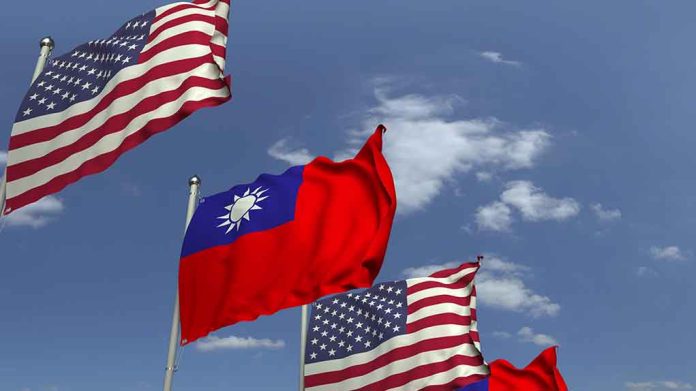
In a significant geopolitical maneuver, the U.S. government has sanctioned $567 million in military aid for Taiwan, amplifying existing tensions with China.
At a Glance
- The United States authorized $567 million in military aid to support Taiwan against increasing Chinese military pressure.
- Despite severing official diplomatic ties in 1979, the U.S. remains Taiwan’s largest arms provider.
- China views Taiwan as its territory and opposes any form of military aid from foreign nations.
- Past arms deliveries, such as upgraded F-14 fighter jets, have faced delays, sparking concern in Taiwan.
U.S. Military Backing for Taiwan
The Biden administration has greenlit a $567 million military assistance package for Taiwan, leveraging the Presidential Drawdown Authority to bolster the island’s defense systems. This development, amidst booming military expansions by China, aims to enhance Taiwan’s air defense and asymmetrical warfare capabilities. It comes on the heels of other significant military transactions aimed at strengthening Taiwan’s ability to ward off potential aggression from China, which perceives Taiwan as a breakaway province.
Taiwan, which has historically faced threats from China’s military, will witness a significant upgrade in its defense infrastructure through this package. The United States, while not maintaining formal diplomatic ties with Taiwan since 1979, continues its long-established tradition of being Taiwan’s principal military partner, thus ensuring that the defense capabilities of the island are on par with regional threats.
China strongly condemns the recent announcement of the United States government's approval of military aid worth approximately $567 million to the #Taiwan region, a defense spokesman said on Wednesday. #US https://t.co/DfiuuacO5g pic.twitter.com/q4Jlkg9spb
— China Daily (@ChinaDaily) October 9, 2024
Complex U.S.-Taiwan Security Partnership
The U.S.-Taiwan security relationship is intricate, involving various facets like arms sales and military training, managed via the American Institute in Taiwan. This nominally private organization oversees what pressures an already delicate balance between the U.S. and China, playing a pivotal role in ensuring that armed support aligns with diplomatic undertakings. Strategically, the United States must weigh the ramifications of its support to avoid unnecessary provocations that could lead to heightened conflict with China.
Amidst these challenges, the United States reasserts its commitment to Taiwan, emphasizing the augmentation of Taiwan’s self-defense and maritime security capabilities. This aid package marks a notable precedent with the Biden administration using a sovereign state-style program, a move that the Chinese government has criticized, further straining diplomatic relations.
China’s Perspective and Potential Repercussions
China has persistently demanded that the U.S. halt its military engagements with Taiwan, interpreting these actions as interference in its internal affairs and a gesture that encourages Taiwan’s independence aspirations. By approving this latest military aid, the U.S. braces for heightened tensions with China, which relies heavily on “coercion without violence” strategies to influence Taiwan.
The potential U.S. arms delivery delays and China’s growing rhetoric of “unification” underscore the urgency and complexity of U.S. foreign policy regarding Taiwan. As this geopolitical scenario unfolds, the onus remains on diplomatic maneuvers and military preparedness to keep peace while upholding Taiwan’s right to self-defense and autonomy.
Sources:
- US approves $567m in military support for Taiwan
- Taiwan: Defense and Military Issues
- Why does the US security partnership with Taiwan matter?
- China objects as US approves military aid to Taiwan under program aimed at sovereign nations
- Biden Greenlights $567 Million in Additional Military Aid for Taiwan
- U.S. Strengthening Deterrence in Taiwan Strait
- US approves first-ever military aid to Taiwan through program typically used for sovereign nations
- The United States and stability in the Taiwan Strait
- US Boost for Taiwan Amid Rising Chinese Military Pressure
- The US is quietly arming Taiwan to the teeth















